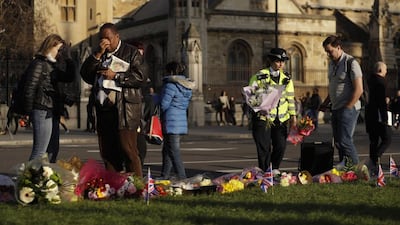Until Wednesday, London had largely escaped unscathed from the latest wave of ISIL-inspired attacks. Not anymore. The shock was that it had not happened before, mixed with relief that, without wishing to seem insensitive, it was not worse. Much credit must go to the police and security services for both, a word-class intelligence system and as I saw from the Houses of Parliament on the day, top-rate security.
When you enter Parliament – as I do several times a week – you penetrate a bubble in more ways than one. It is, after all, a royal palace as well as the oldest parliament in the world. You are cut off from the rest of the city, shielded by security and secluded from the urban mayhem outside. You are governed by all forms of arcane rules. British politicians are all-too-often accused of being too comfortable inside this Westminster bubble.
Well, that comforting bubble burst and a huge vulnerability became evident. The perimeter of the parliamentary estate was breached. It was just one man but it could have been more. I was only a few metres from the scene of the fatal stabbing of PC Keith Palmer minutes before it happened.
Even when the shouting began, nobody had a clue how serious it was, even if it was an attack. When, eventually, everybody, including cabinet ministers, was told, the fragments of information were far from comforting. We were told – inaccurately, as it turned out – by a member of security that there were four attackers, one of whom was dead. So where were the other three? In the building?
The stoicism and resilience of Londoners was much in evidence in the following days and routine life returned. Just 48 hours after the attack, I stood opposite where it occurred and it was now a huge tourist attraction, where selfie sticks were in full use. Hordes of television cameras were still there but, as should be the case, London had hardly stopped working for a second.
In many ways, the wider country was in a bubble too. Many wanted to believe that the security threat was not that severe. Many still see the threat as an overseas one. Yet as in the July 2005 attacks on London, in which 52 people died, the assailant was British; on this occasion he was born and raised in Kent.
The question that must be asked is: have Britain and its allies progressed at all in defeating these extremists? Are the British people safer in any way? The security may be tighter, but the threat is almost certainly higher.
In this attack and recent attacks in France and Germany, ISIL adherents have shunned Al Qaeda’s high-tech tactics and used vehicles to drive into crowds. By keeping it simple, they have made the task for the intelligence services so much harder. Nobody is going to ban cars or car-hire companies.
Commentators have asked whether too much attention is given to such incidents, thereby fuelling the terrorism itself. But is the attention always focused in the right way? Is too much attention paid to the perpetrators and not the victims?
Perspective is also required. Grim as it was, remember that research shows that over 4,000 people a year in the city are injured in knife crimes. Five people a day die in road accidents across Britain.
But the more important perspective is seemingly lost, not just in Britain but also in Europe and the United States. That is how similar all victims of ISIL attacks are – but how differently they are mourned.
Last July, more than 250 Iraqi shoppers were killed in one attack in Baghdad at the end of Ramadan. Eleven days later, 84 people died in the attack in Nice in southern France. Both atrocities had a devastating impact on these cities. As with the recent Brussels and Paris attacks, social media started a #prayforLondon campaign. Was there one for Baghdad? After the London attack on Wednesday, the United Nations Security Council respectfully had a minute’s silence as they did for Paris, Brussels and Nice. There was none for the ISIL suicide bombing in Baghdad last Monday that killed 27 people or after any other ISIL attack in Iraq and Syria. It is hard to find any indication that there has been for any of the attacks that have targeted cities in the Islamic world.
Cast your mind back to 2014 and the beheading of the American journalist James Foley by ISIL. But he was not the first; he was just the first American. In the days beforehand, ISIL members were also brutally beheading and crucifying innocent Iraqis and Syrians. Foley’s awful death was front-page news around the world; their fate a footnote at best.
This is the attitude that must change if there is even a faint hope to challenge extremist ideology. As long as victims in Africa and the Middle East are little more than numbers to those in the West, then the root cause of what has happened will not be understood. If we still hold on to a hierarchy of victimhood, there is little chance. Every single victim of those Baghdad bombings is entitled to as much sympathy as those in Europe or the US.
Understandably the western media are going to focus more on atrocities in the West. The attack in London was an attack on parliament at the heart of British power, not an everyday event. But to get the balance right, we must try to make greater efforts to truly understand the monstrous horrors of the conflicts in Syria, Iraq and other places as much as we seek to understand the attacks in London.
Chris Doyle is director of the London-based Council for Arab-British Understanding
On Twitter: @Doylech

